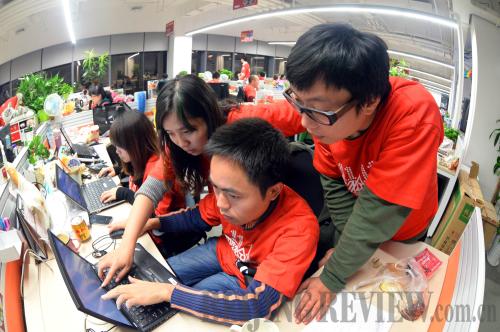|
 |
|
RUSH HOUR: Employees have their hands full in Alibaba's Hangzhou-based headquarters on November 11, 2013, the day Alibaba reported a transaction value as high as 35 billion yuan ($5.6 billion). Dubbed Singles Day, November 11 has become the country's biggest online shopping day, similar to Cyber Monday (SHI JIANXUE) |
World's greatest bazaar
Alibaba's meteoric rise has much to do with its visionary founder, Jack Ma. It is Ma who has taken the company from connecting businesses to each other to a scattering of ventures that let companies sell directly to the public (Tmall) and enable members of the public to sell to each other (Taobao). Due to the sheer size and growth of the Chinese market, the two ventures processed more transactions in 2013 than Amazon and eBay combined.
Ma started Alibaba in 1999 from his apartment in Hangzhou, east China's Zhejiang Province, and now employs some 24,000 workers. He has become the richest man in China, with his shares valued at $19 billion after the IPO.
"We have a dream," Ma said as he rang the opening bell to officially launch the flotation on the NYSE. "We hope in the next 15 years the world changes because of us. We hope in 15 years people say this is a company like Microsoft, IBM, Walmart. They changed, shaped the world. We want to be bigger than Walmart."
Ma is an unusual CEO for a tech company. He reportedly failed the national college entrance exam twice before getting in due to low scores in mathematics. The son of professional storytelling and ballad-singing performers, he still does not know how to code. Reporters used to call him "Crazy Jack" for his animated way of speaking and bold goals.
Ma eventually became an English teacher, earning $12 a month at a local university. Crazy Jack then had his first entrepreneurial idea, launching a translation company. The idea took him to the United States, where he discovered the opportunities available on the Internet.
China Pages, his first e-venture, was a bust and he lost control of the company in a joint venture with China Telecom. Then, a few years later, he launched Alibaba.com. Within a few months the company had raised $25 million in venture capital, and an empire was born.
After the company filed for its IPO, Ma wrote an open letter to Alibaba employees. In it, Ma told the team that there is "unparalleled ruthlessness and pressure" ahead, but that the company can overcome it by sticking to its original mission and culture.
"We know well we haven't survived because our strategies are farsighted and brilliant, or because our execution is perfect, but because for 15 years we have persevered in our mission of 'making it easier to do business across the world,' because we have insisted on a 'customer first' value system, because we have persisted in believing in the future, and because we have insisted that normal people can do extraordinary things," Ma wrote.
HK rethinks rules
Alibaba's choice of the NYSE for its debut is interesting in that the company did not choose Hong Kong for its fundraising efforts. Hong Kong is traditionally the first stop for mainland companies when they want to issue an IPO overseas. But Alibaba decided against Hong Kong when regulators there refused to make an exception for the company's partnership system. The company's structure includes a small group of company insiders who nominate the majority of the board of directors without owning a controlling stake, reports the Associated Press.
Alibaba executives credit the unusual partnership system as necessary to preserve its innovative culture, but Hong Kong's listing committee said it would go against the exchange's "one share, one vote" principle. Dual-share partnership structures are more common in the United States, especially among tech companies.
The opportunity to list the biggest IPO of all time has prompted some Hong Kong regulators to rethink its rules on shareholding structures.
"The day for that debate has finally come," wrote Charles Li, CEO of stock exchange operator Hong Kong Exchanges and Clearing Ltd., on his blog. The exchange recently issued a "concept paper" to solicit public opinion on "weighted voting rights."
"Let's all be frank, it would have been nice if this could have been released earlier," he added.
David Graham, Hong Kong Exchange's Chief Regulatory Officer and head of listing, said the decision was not based on the loss of the Alibaba listing, but the timing certainly seems more than coincidence. Should Hong Kong change its rules to attract blockbuster IPOs? Or, do the current rules make it fairer for all shareholders?
Whatever the solution, it is clear that Hong Kong will have to do something or risk missing out on the wave of Chinese tech companies hitting the market. The Hong Kong exchange has focused on commodities and derivatives, reports the Wall Street Journal, while nine of the 10 biggest IPOs by Chinese Internet companies since 2009 have gone to the United States.
| 